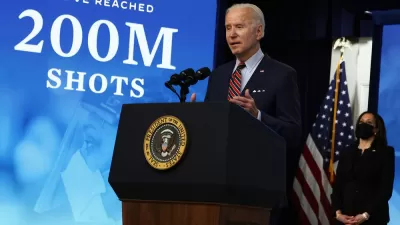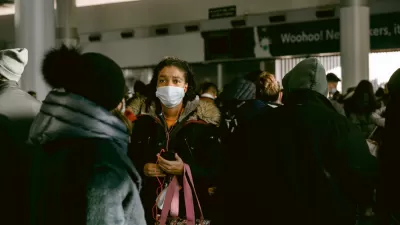So much for vaccines enabling the U.S. to achieve the cherished goal of herd immunity for COVID-19. It is becoming increasingly clear to many public health experts that likely will not happen, according to a New York Times global health reporter.

Two months ago many experts likened the U.S. position in the pandemic to a battle between virus variants and vaccines, as if one would emerge a winner. Mandavilli writes that a new consensus is emerging, one that entails living with the virus.
It is already clear, however, that the virus is changing too quickly, new variants are spreading too easily and vaccination is proceeding too slowly for herd immunity to be within reach anytime soon.
“The virus is unlikely to go away,” said Rustom Antia, an evolutionary biologist at Emory University in Atlanta. “But we want to do all we can to check that it’s likely to become a mild infection.”
Politico supported the endemic end game scenario in an article framing the pandemic challenge facing President Joe Biden in his next 100 days published just a few days before the Times' piece.
"[C]ontainment, not eradication, is the most realistic goal: Public health experts say the coronavirus is here for the long haul," wrote health care reporter, Dan Goldberg, and health care editor, Joanne Kenen on April 30.
Now, the challenge for Biden, his response team and state health officials will be managing the rolling series of outbreaks possibly driven by more dangerous virus variants, while avoiding the wishful thinking of the Trump administration, which downplayed the disease's lethality.
Not all experts agree
Dr. Ashish Jha, dean of the Brown University School of Public Health, expressed some skepticism on the notion that herd immunity is not achievable.
"We don't know if it's true," he told CNN New Day hosts John Berman and Brianna Keilar on May 3, but he did acknowledge that it would be "unfortunate" if the country weren't to reach herd immunity levels.
"At herd immunity levels, you really don't have to have any restrictions at all and the virus remains in check," said Jha.
"But that said, the experience from Israel is that once you get to about 50-55% of the population vaccinated, which a few states have now hit in the U.S., you really see case numbers plummet. So we may not get to zero, we probably won't, but if we can get infections under very low levels, most of us can get back to our lives in normal ways. I think we can probably live with that.
"With around 60 percent of its population vaccinated, Israel has managed to almost fully reopen its economy and crush the number of coronavirus cases and deaths to nearly zero," wrote for Vox in an endgame article referencing Mandavilli's piece.
The country still has some requirements in place — particularly indoor masking and vaccine passport requirements — but it’s much closer to normal than it could afford to be, with any guarantee of safety, just months ago.
Fauci gets last word
The nation's foremost public health expert, Dr. Anthony Fauci, appeared to agree with Jha.
“People were getting confused and thinking you’re never going to get the infections down until you reach this mystical level of herd immunity, whatever that number is,” he told Mandavilli.
“That’s why we stopped using herd immunity in the classic sense,” he added. “I’m saying: Forget that for a second. You vaccinate enough people, the infections are going to go down."
Related in Planetizen:
-
Will Israel Show Us the Way Out of the Pandemic? February 14, 2021
-
Post-Pandemic: Living with COVID, January 31, 2021
-
Pandemic Endgame: The Goalposts are Moving, December 30, 2020
- Pandemic Endgame, May 18, 2020
FULL STORY: Reaching ‘Herd Immunity’ Is Unlikely in the U.S., Experts Now Believe

Planetizen Federal Action Tracker
A weekly monitor of how Trump’s orders and actions are impacting planners and planning in America.

Congressman Proposes Bill to Rename DC Metro “Trump Train”
The Make Autorail Great Again Act would withhold federal funding to the system until the Washington Metropolitan Area Transit Authority (WMATA), rebrands as the Washington Metropolitan Authority for Greater Access (WMAGA).

DARTSpace Platform Streamlines Dallas TOD Application Process
The Dallas transit agency hopes a shorter permitting timeline will boost transit-oriented development around rail stations.

Renters Now Outnumber Homeowners in Over 200 US Suburbs
High housing costs in city centers and the new-found flexibility offered by remote work are pushing more renters to suburban areas.

The Tiny, Adorable $7,000 Car Turning Japan Onto EVs
The single seat Mibot charges from a regular plug as quickly as an iPad, and is about half the price of an average EV.

Supreme Court Ruling in Pipeline Case Guts Federal Environmental Law
The decision limits the scope of a federal law that mandates extensive environmental impact reviews of energy, infrastructure, and transportation projects.
Urban Design for Planners 1: Software Tools
This six-course series explores essential urban design concepts using open source software and equips planners with the tools they need to participate fully in the urban design process.
Planning for Universal Design
Learn the tools for implementing Universal Design in planning regulations.
Roanoke Valley-Alleghany Regional Commission
City of Mt Shasta
City of Camden Redevelopment Agency
City of Astoria
Transportation Research & Education Center (TREC) at Portland State University
US High Speed Rail Association
City of Camden Redevelopment Agency
Municipality of Princeton (NJ)





























